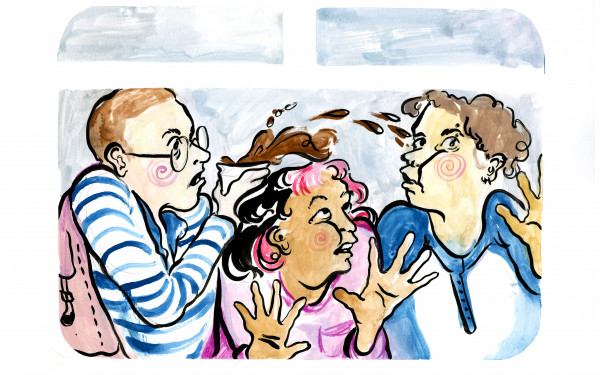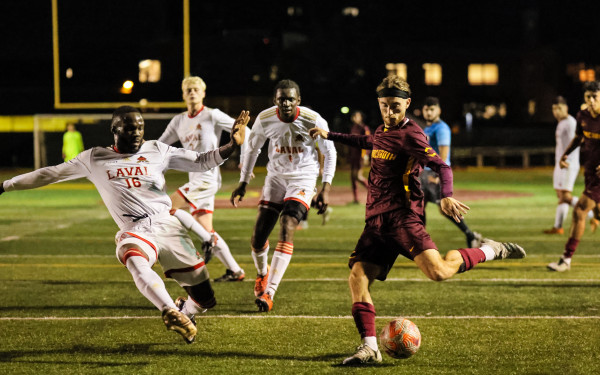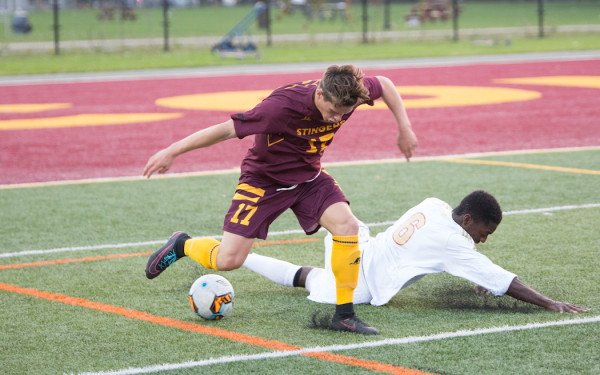On the Wrong Track
STS Policy Temporarily Left Drunk Students Stranded in Sherbrooke
Walk around any city on a Saturday night and you’ll see it: a bus stop populated by a small horde of revellers: some talking loudly, some looking frantically through their pockets for a lost bus pass, some heaving their guts on the curb—and all making their way home after an evening of drinking. The late bus home is a common experience for many party-goers, but in cities with a significant university student population, a few problems might emerge.
Young students, partying and away from their hometowns for the first time, are sometimes prone to shenanigans. After a long night, a bus ride across town is often the cheapest and most accessible way for them to reach their front door. For all of last week, this wasn’t the case for students at the University of Sherbrooke.
On Sept. 18, the bus driver’s union of the Société de transport de Sherbrooke, Sherbrooke’s public transit authority, ruled that bus drivers were no longer required to pick up groups of students who appear to be intoxicated, citing frequent cases of disruptiveness from students on their buses during late evening hours.
The ruling was met with criticism from student groups, with the University of Sherbrooke Student Federation calling the policy “discriminatory” towards students. Following the outcry the STS suspended the policy last Friday, but the issue still brings up important issues of safety, both for drivers and students.
The safety of drivers and passengers should, of course, be considered when discussing this issue. However, a law is already in place to protect the safety of bus drivers and the public in instances of student misbehaviour. According to Canada’s Criminal Code anyone found “causing a disturbance in or near a public place by being drunk is guilty of an offence punishable on summary conviction.” This means that drunk students, if and when their carousing turns into chaos, can be faced with police intervention in an attempt to reign in their rowdiness.
The transit union’s decision was hastily made and insufficiently thought out. The most glaring hole appears in just what exactly classifies a group of students as “looking drunk.” The rule stated that bus drivers can completely bypass bus stops where drunk students are gathered—but how would a bus driver even be able to properly ascertain this without first stopping the bus? Not only that, but sober passengers also waiting at the same bus stop might get left out in the cold if bus drivers fail to stop. The logistics of this ill-conceived rule seem to hurt more people than they’re trying to help.
More importantly, the rule failed to take into account any viable alternatives for drunk students to get home in a safe and frugal way. Cabs are often too expensive for budget-conscious students, biking may be difficult depending on your level of inebriation and walking might be inconvenient depending on your proximity to home, not to mention the risks that walking home while drunk can bring.
Some critics are worried that driving may appear a more and more appealing alternative to young party-goers if buses are no longer an option. The consequences of this restriction could be life-threatening. According to Statistics Canada, impaired driving rates are highest among young adults, with over 90,000 incidents reported in 2011. The need for cheap and convenient public transportation alternatives to driving is an obvious strategy to combat these startling statistics, something that the STS is attempting to take away through this policy.
Other schools have attempted more innovative solutions to this issue, with the University of Guelph organizing a Magic Bus program that brings students from common downtown party locations to areas of the city where students typically live.
The bus runs as late as 3:30 a.m. and is paid for by a $1.88 student fee levy, making it technically free for passengers to board. The service also features sober volunteers stationed at the bus stops enforcing rules and giving extra help to too-drunk party-goers. The logistics of how a similar plan might be implemented in Sherbrooke aren’t clear, but the idea clearly has its merits and should be explored further.
Fortunately, the STS reportedly is currently in talks with student groups at Sherbrooke to find a better solution to the policy. Whatever that solution may be, let’s hope that this time they keep the safety of students, along with that of bus drivers, in mind.





_600_375_90_s_c1.jpg)

